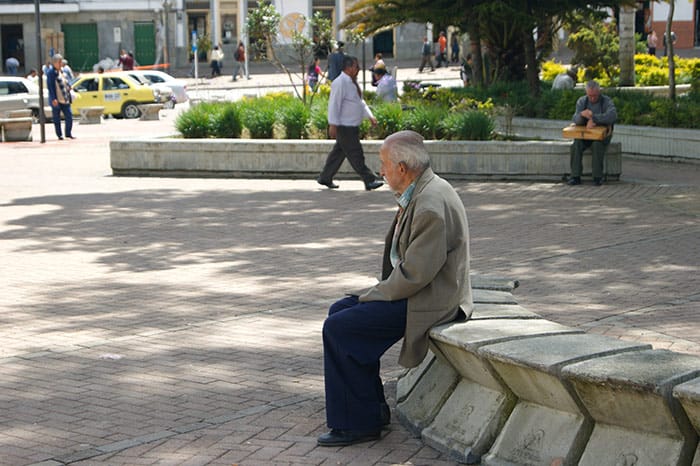All of us want our elderly loved ones to be safe. Unfortunately, unforeseen emergencies sometimes happen, and being unprepared for them often leads to unwanted consequences.
Of course, prevention should always be your first step, however, to further enhance safety a medical alert watch can be a great choice for seniors. It’s particularly useful for those who live alone, but any senior can benefit from it: getting help in case of emergency is so much easier with a medical alert watch on your wrist.
I’ve met so many seniors in the hospital who had been lying on the floor in their homes for hours or even days before someone finally became aware of them and called the ambulance.
In many of those cases, an emergency watch would have shortened the time between the accident and the hospital admission considerably.
Medical alert systems come in many different forms: necklaces, bracelets, wristbands, and watches are some of the most popular devices.
In this post, I’ll show you how to find the best medical alert watch for your senior loved one, what are the most important features to look for, and how to avoid the most common pitfalls. While it’s true that there are a lot of models to choose from, only a handful of them is worth the money.
How Do Medical Alert Watches Work?
A medical alert watch can recognize many emergency cases. For instance, some models can detect falls and lack of activity. If the senior wearer falls or no activity is detected over a certain period of time, the medical watch reaches out for immediate help.
The basic functionality of every medical alert watch is to make it easy for seniors to call for help in case of an emergency. Usually, there’s a dedicated button on the watch for this purpose.
Home-based systems operate over either a landline or a cellular network but only inside your home. They send a signal to the medical alarm base that either reaches out to the medical alert service provider or calls the pre-programmed numbers.
In contrast, mobile systems don’t require a medical alarm base in your home and they work virtually everywhere. They’re especially useful when a senior often leaves the house or tends to get lost.
Monitored and Non-Monitored Medical Alert Watches
Basically, there are two types of medical alert systems: monitored and non-monitored.
If you press the emergency button on a watch connected to a monitored system you will reach out to a 24/7 dispatching service that can then call a family member or the ambulance. These systems are pretty reliable because most of the time they can send help even if the senior is unconscious (if the device has a proper automatic fall-detection feature enabled) or can’t talk. The vast majority of monitored alert systems are subscription-based and usually, a monthly fee is charged for the service.
A non-monitored system is not connected to a service provider but in an emergency, it calls the pre-programmed numbers one by one until someone answers. Of course, these systems are cheaper as once you buy the device there are no additional costs.
Things to Consider When Buying a Medical Alert Watch for Seniors
Fall-Detection Feature
Medical alert watches with a fall-detection feature have gained more popularity in the last few years. If a senior falls, the device detects it with the help of the built-in accelerometers and different sensors and automatically calls the service provider without touching a button.
The fall-detection feature can be particularly helpful in the case of those seniors who have a higher risk of falling. Therefore, older adults with mobility difficulties, balance issues, visual impairment, parkinsonism, or hypotension can benefit the most from it.
In fact, besides being extremely useful in certain situations, fall-detection technology has its own drawbacks: sometimes false alarms happen (e.g. when someone just loses balance without falling), and usually, you have to pay an extra fee for the service.
Bottom line? An emergency watch with fall detection can, without doubt, provide extra protection in certain situations. This is especially true in the case of those elderly people who are at high risk of falling.
Check out this article to learn more about how you can prevent falls effectively.
Can a Traditional Smartwatch Be Used as an Emergency Watch?
Generally, a smartwatch is not designed to serve as a medical alert watch, but in some cases can do the job more or less. Note that a smartwatch has many features, a complex menu system, and small buttons (many models don’t have any buttons at all, just the touch screen) that sometimes can be confusing for the elderly.
The main purpose of a traditional smartwatch is not to serve as an emergency device, however, it can provide an acceptable solution. Even better, if it has a dedicated emergency button. Anyway, keep in mind that if safety is a top priority, a dedicated device is always a better and more reliable choice.
Water Resistance
The whole purpose of a medical alert watch is to provide help in every situation, even during showering. If seniors have to take off the watch whenever it can get wet they may forget about it and leave it in the bathroom (more on bathroom safety here), which significantly reduces safety. When buying, ignore models that are not waterproof.
Opt for a Watch with Long Battery Life
Traditional smartwatches usually last for a day or two without charging. A medical alert watch often has a much longer battery life that can last up to several weeks. Make sure you opt for a model that shows in advance when it requires charging. The longer the battery life, the better.
Watches with GPS Tracking
Wandering is not uncommon among seniors suffering from dementia. Often they get lost and can’t find their way home. Sometimes they get so confused they forget to use their emergency watch or when they reach out for help, they can’t tell their current location.
In those situations, a GPS tracking feature can be a lifesaver. If your elderly loved one doesn’t suffer from cognitive impairment or dementia, built-in GPS is not necessary but otherwise, especially for Alzheimer’s patients, it’s a must-have.

Seniors With Hearing Loss
Many older adults suffer from hearing impairment. For them, it’s particularly important to have a medical alert watch with loud enough speakers. If they can’t hear clearly the called person (either a dispatcher or a relative) that could lead to misunderstandings and ineffective communication.
That’s why before buying, always check if the speakers of the device are loud enough for your loved one. Set the volume according to the severity of your loved one’s hearing loss before they start using the watch. As a side note, we’ve collected the best doorbells for those who suffer from hearing loss here.
Some Scenarios When a Medical Alert Watch Can Be Really Useful
In many cases, the reason for using an emergency watch is basically the fear of falling. However, there are other emergency scenarios when a medical alert watch can be particularly beneficial for seniors.
Medical emergencies can happen all of a sudden: in case of a heart attack or stroke seniors may lose their ability to stand up or talk and call for help. When using a wearable emergency watch they just have to push a button which requires much less effort.
If a fire breaks out or a natural disaster happens and your elderly loved ones don’t have access to a landline or cell phone, they can still reach out for help by using an emergency watch. Unfortunately, many accidents also happen in the kitchen, and a reliable medical alert watch may help to mitigate the consequences (here’s how you can make the kitchen safer for seniors).
The same is true in the case of burglary (or suspicion of burglary). Although according to statistics older people have lower chances of property crime than younger adults in the U.S. (source), elderly persons who live alone are at a higher risk.
Some devices are capable of monitoring seniors’ activity and vital signs (such as heart rate) as well. In case of an emergency, they can automatically reach out for help.
Popular and Reliable Brands
Lively Mobile+
Lively has many products, one of them is a wearable device that works with your smartphone. It has a big, built-in emergency button and by pressing it you’ll be connected to a live, trained agent who can send help if needed.
It’s waterproof, has a fall-detection feature, and comes with a charging dock.
The good thing is that you can cancel the service anytime if you’re not satisfied as it doesn’t require a commitment.
MobileHelp
MobileHelp Smart is a smartwatch that has many functionalities. It features durable hardware with water and dust resistance, GPS location tracking, a 4G cellular connection, a built-in heart rate sensor, and U.S.-based emergency monitoring. It comes with a health app that is powered by Samsung.
Medical Guardian
The Freedom Guardian package of Medical Guardian offers an emergency watch with not only a single button but with a color display with large icons. The device has a GPS tracking feature, and built-in Wi-Fi, and you can set alerts and reminders too. It’s splash resistant, so you can have a shower without taking it off, but submerging it is not recommended (so it’s not suitable for swimming).
It comes with a pre-installed SIM chip and it doesn’t require a smartphone to establish an emergency call. It has a battery life of up to 48 hours, however, the service provider suggests placing the watch on the charger every night.
Medical Alert
The Home & Away Elite package of MedicalCareAlert offers protection at home and on the go as well. You can wear the water-resistant emergency button around your neck or on your hip. It comes with GPS location services and fall detection is also available for an extra fee. MedicalCareAlert offers a risk-free trial.
Apple Watch
Apple Watch is a well-known brand and many older adults already own one. While it’s true that the Apple Watch isn’t designed to be an emergency device in the first place, it can do the job pretty well. Apple Watch Series 4 or later comes with fall detection and Emergency SOS features. It’s also capable of basic ECG recording that in certain situations can be pretty useful.
Unlike the above-mentioned watches, Apple Watch can serve as a non-monitored medical alert device. In case of an emergency, by holding down the side button the watch calls 911 and also notifies the pre-defined contacts.
Conclusion
A medical alert watch can, without a doubt, be a lifesaver, especially for those seniors who live alone. In many cases, a basic service is just enough to provide peace of mind, however, in certain situations, the fall-detection feature or the built-in GPS is worth the extra cost. When buying, always choose an emergency watch according to your elderly loved one’s health status and needs.











